#also its pronunciation is different when it means people
Note
wait. why are you sexy gengar
Oh, so this is some kinda story! And I guess now y'all are gonna hear it.
The truth is I've been holding out on most of you because back on my birthday @zerozeroren gifted me with an incredible piece of art that is going to require a bit of explanation.
So here we go.
Being a lover of So Bad It's Good Media and a watcher of Booktube videos, it was inevitable that I would hear about the supposedly spicy, supposedly deadly fantasy trainwreck that is Lightlark by Alex Aster. For anyone who might not have seen the liveblogging I did of that, I thoroughly enjoyed the book for a bunch of reasons Aster never intended and had to pause listening to the audiobook several times because I had to stop and laugh at the ridiculously poorly thought out shit going on. For anyone who's the sort to indulge in So Bad It's Good media, it gets my recommendation. (The sequel Nightbane does not; that was both utterly stupid AND horrifying in its unintentional implications. But I digress.)
Anyway, this piece of art came about from talking to Ren about some of the characters, particularly our main character Isla Crown and her love interest Oro.
There's been a lot of confusion on how to say Isla's given name. Before I listened to the audiobook, I would have assumed it would have had a pronunciation similar to island with a silent s. But no, according to the audiobook narration, her name is pronounced Ice-la. Upon hearing this, Ren declared that a "Pokemon-ass sounding name." And that's when I realized that Isla is implied to be humanoid but it's never actually specified. The people of Lightlark are divided into six different types of beings, and Isla is a Wildling. But the only actual descriptions we get of her are that she's got brown hair and she looks like her mother. So in defiance of the obvious setup to picture her looking like an ice-type Pokemon, I chose to picture her looking like my favorite purple ghosty boy Gengar.
But that's only the part of the picture I've been using for my icon. I haven't shown most of you the other part of the picture that has Oro. Oro is a Sunling. (I swear these names are killing me.) The big conflict of Lightlark is that all of these fantasy races have been cursed and they're trying to complete a ritual according to a prophecy in order to undo them. Sunlings in particular are cursed by being harmed by the sun, the very thing that would normally give them power. Oro is also something called an Origin, meaning he has powers from the other fantasy races, though the primary one we see him use besides his own power is the Skyling ability to fly. Between being harmed by sunlight, the implied nocturnal existence that comes with that, and his ability to fly, Ren and I decided he was basically a vampire. And I was like, "We need to pick a dorky vampire to represent him. I know! He should look like Alucard! Not sexy new Castlevania animation Alucard but like what Alucard looks like in Captain N: The Game Master!" (For the record, they are technically the same character. Alucard in Captain N is the same Alucard from the Castlevania series. But the character designs in Captain N: The Game Master are...questionable.)
And that led to this:

Take it in. It is a thing of cracktastic beauty. I couldn't have asked for a better birthday present. What else can I say but Ren has done it again.
18 notes
·
View notes
Text
Fun small bit of progress! I'm reading 撒野 using this free app called Smart Books because it has TTS and parallel sentence translation and click word translation if I want it (although Readibu, Pleco, Zhongwen chrome extension, and the built in mobile web browser and various Reader app click translation tools also work fine for any reader who'd like translations when needed).
And as expected, I know most words in this novel since it's roughly around my reading level. The sentence translation tool I've used a bit to help clarify when I'm not sure how to interpret the use of a particular word or some long sentence I couldn't clearly figure out.
Anyway the progress: I've been reading aloud to myself. What's surprising is I took a few months off of studying Chinese (although I'm sure I see at least a tiny bit of Chinese at least weekly but that's not a big dense amount of input it just may help me not forget what I've learned), and I'm still able to read to myself aloud. I knew I could get myself to recall word meanings of words I'd learned if I just read for a few hours. Word meanings come back even if they're "rusty" given enough time to get used to Chinese again. But being able to pronounce the words I'm seeing? I was surprised, because I've been doing more japanese the past few months and feared as I learned Kanji pronunciations and words that used similar characters to Chinese, I'd start accidentally seeing Chinese and only having Japanese Kanji pronunciations come to mind. But thankfully that hasn't happened!
I'm also happy I must've learned common words better than the last time I took a break from Chinese. Because last break I took, I did forget a fee hundred hanzi pronunciations (out of 2000). Now that I'm getting back into it, the 2500-3000ish hanzi I know, I'm recalling the pronunciations of easily (except for a few very specific ones I always confuse for a particular other pronunciation which I mess up even when I haven't taken a break).
So yeah! I'm very hype about it!
I'm a little worried this means my japanese reading To Recognizing pronunciation of Kanji is still very weak. But hey, I expected less strong remembering for that at least.
#progress#rant#also for better or worse ive realized that when i recall a hanzi pronunciation i dont think of the tone AT ALL#by that i mean i say it. the way i recall it sounding. so im pronouncing A TONE.#but as soon as i conciously try to remember: what tone was it? what tone DO i use? i cant remember. i dont know#i second guess myself. so like. i could say xiansheng and guniang and id know if they sound right or wrong when i say them#but i cant recall guniang tones. just that i know how it sounds when i hear it. and im trying to say it how i remember hearing it.#and at this point im worried over thinking about which tone do i say? is more harm than good#because i am saying A Tone confidently im just not thinking conciously slowly about which one#so if its wrong people CAN hear it and tell me its wrong so i can correct it.#but when i think IS it wrong then i dont commit to a tone and it IS wrong because im pronluncing it weakly and with no tone#and when i think about which tone to yse i dont commit to using any tone#also theres the whole situation of tone pairs actually are the main sound variations for tones#because a 4th tone in the first s#part of a 2 hanzi word sounds different then the 4th tone in the second hanzi in the word
6 notes
·
View notes
Text
also i finally finished the silm earlier and oh my god i understood narn i chin hurin so much better this time. like i know the whole thing isn't included but the fact the main parts are mentioned *after* i knew who the heck everyone in it was and where everything was happening made it so much more understandable now than when i first read it back when i was like 14 bc i went like hobbit -> lotr -> children of hurin with a lot of time in between where i forgot stuff
#bc i remember the first time i read it i was so lost like “where the fuck is doriath and dor lomin and all these places who are these..#..people. why wont turin come back. why does this man have to change his name every five seconds. whos morgoth?“ and so on#like i especially remember going “why is anglachel/gurthang like...evil. yeah you said this guy who made em is 'the dark elf' but what does#..“does that actually mean? he could just be goth i dont fucking know why we don't like him” and reading it now i was like Oh. Haha. Fuck.#i think its funny the main thing i remembered was being like “damn i love beleg and mablung”. past aimenel knew what was up#unrelated the hunting of the wolf was metal as fuck?????#i say that like it doesn't apply to so much in the silm but like. bro#i thought the whole “of beren and luthien” chapter was gonna be kinda boring bc i knew about most of the main stuff that happens already but#i was actually getting back into it all as i was reading#its weird i thought the audiobook would help but i think it was too slow#bc i had like ~8 hours left but reading it myself it took nowhere near that#i like hearing how people read for different characters and stuff and also i like knowing how things are pronounced bc even with the..#basic pronunciation thing in the back i still definitely fumble some names when i read them in my head lol. thinking about how many..#...different ways ive heard Eärendil for instance#or like not knowing for YEARS that dh is th.#dont get me started on how fucked up i probably read anything thats in there in adunaic#butchering every name in the akallabeth speedrun any%
1 note
·
View note
Photo
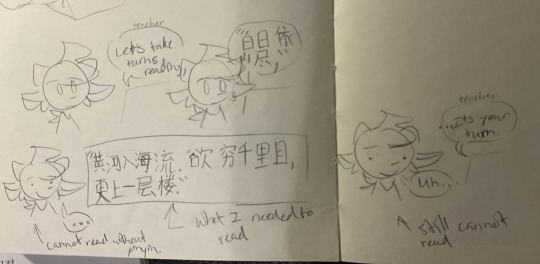
Man i just love this language so much
#paper’s art#paper is talking#Not exactly my teacher’s fault i cant read#and i can understand why she gets impatient because i can only read on the same level as a pre k-er probably#But i mean.#Telling that its my turn doesnt help me#also excuse my bad handwriting#People who can read chinese are so cool and smart.#I dont care if its your normal language you use#if you can memorize the pronunciation and meaning of the 239847237428938108 words#(especially when half of them are the same sound but different tone/character)#youre so cool
1 note
·
View note
Note
Now I'm wondering how countries like Japan and China teach literacy.
Since kanji / hanzi don't really have that much in the way of phonetic elements, they kinda have to teach them by memorization and I don't think they have many reading comprehension problems over there.
(Although both countries do have supplementary phonetic writing systems in the form of bopomofo and pinyin for China, and the kanas for Japan)
--
FAVORITE SOAPBOX TOPIC UNLOCKED!
RELEASE THE KRAKEN!
It's a little closer to teaching vocabulary than spelling, but the same kinds of principles apply: You teach the building blocks, like the traditional radicals, which aren't so different from teaching Latin and Greek roots in an English class for English speakers.
And, as a matter of fact, lots of those radicals do predict pronunciation, just not in every single case. They can also be clues to meaning, but again, not absolutely consistently. Many characters have a sound-cueing radical on one side and a meaning-cueing radical on the other. It's just that only some are still useful in the modern day, while others are more like the English word 'plumbing' where knowledge of Roman lead pipes explains why this word comes from the one for lead, but the root probably wouldn't help a kid learn the word in the first place.
One similarity to teaching phonics would be teaching students to tell very complicated and similar characters apart: you want to help a student spot all the little building blocks of the character and then spot the ones that are different, not just glance at the whole character and get a general overall vibe. If you do a whole look-based approach, too many characters are too easy to mistake for one another.
Remembering a bajillion Chinese characters is hard if you're trying to memorize them in a year and not all of elementary school, but I think people who don't read them underestimate how many component parts there are and how approachable they can be if you start by learning fundamentals, not just memorizing a few individual characters as though they have no relation to anything else.
They're actually pretty systematic, just in the way that English spelling is with its overlapping systems and historical artifacts, not in the way that highly regular Spanish spelling is.
Having taken a lot of Japanese classes, I will say that Japanese as a foreign language textbooks often do a piss poor job of this and totally do teach kanji in a sight words-y way... But my Mandarin class started with important foundational concepts that served me well in Japanese later even if I bombed out of Chinese class at the time.
Can you tell how irritated I am by all the foreign language learners who think characters are sooooo hard when, really, it's just their crappy textbook? Haha.
They're moderately hard in the way that learning a full adult spectrum of vocabulary is hard, but people do that for foreign languages all the time. The countries that use characters do tend to make sets that are smaller for certain kinds of applications, same as we have things like simple English wikipedia, but a literate adult will always know lots more, whether it's from their career in engineering or their predilection for historical romance novels.
Uh... anyway, the answer is "Bit by bit in elementary school, just like in any other country".
544 notes
·
View notes
Text
Kenpachi's Place
On the subject of "what people call each other" more generally, my favorite Bleach topic, Aizen is also kind of weird about Zaraki. He refers to Renji leaving the 5th for the 11th as Renji being "taken away to Kenpachi's place." Was he. Was he kidnapped. Is Kenpachi's Place a trafficking front.
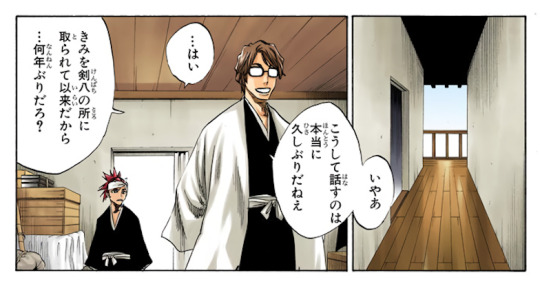

Referring to Zaraki by title is a Choice, for sure. I don't know if anyone else does that (besides Ichigo), but I can think of many who do not, would never.
Referring to the 11th as "Kenpachi's Place" also feels like a Choice. It makes me think about Renji's question to Ichigo when they first meet:

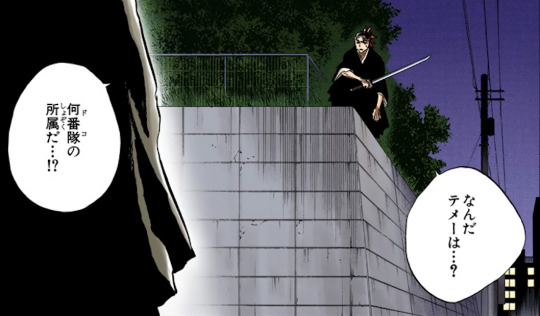
[Bleach 054]
His meaning of is speech bubble is, "Which [number] Division are you affiliated with?" but the pronunciation is just "Where are you affiliated?" So there's already a sense, I guess, that the geographic question of "where" implies your divisional affiliation, and that divisions are thought of as places. Makes sense, given that all the divisions are meaningful geographic spreads in the Seireitei.
Is it still weird that it's "Kenpachi's Place" and not just idk, "the 11th Division"? I mean, I think it is, but it does speak to the unique tradition of leadership succession the 11th's got going on, and how intense the cult of personality is in the 11th, as a division whose nature is extremely tied to the nature of whoever its leader happens to be.
Aizen also never actually refers to the 11th as the 11th, so in order to make that connection we'd have to remember Zaraki's name and number from when he showed up at Byakuya's Place. Why wouldn’t he? Idk but I enjoy it as character info. (NB: Byakuya is perfectly happy to refer to Tousen purely by number, as "9th Captain" and not by any name at all, so there's a lot of different conventions out and about across the various captains.)
#also am never not thinking about that one time hitsugaya tells matsumoto they should go to renji's place (same phrase as aizen uses here)#whatever in god's name that's supposed to mean and however hitsugaya is meant to know where a 'renji's place' might be#and they don't end up at the 6th or some place normal but some random patch of bumfuck rukongai#aizen sousuke#zaraki kenpachi#bleach manga#bleach language#bleach reread 2021#bleach カラー#no brain just bleach
265 notes
·
View notes
Text
[Traditional Chinese Festival] Customs of 臘八節(Laba Festival) in China.Eng Sub
Today(January 18, 2024) is the traditional Chinese festival,臘八節 Laba Festival.Let’s learn about some interesting traditions and customs about this festival.
【About 臘八節(Laba Festival)】
Laba Festival (Chinese:臘八節) is a traditional Chinese holiday celebrated on the eighth day of the month of La (or Layue 臘月), the twelfth month of the Chinese calendar. It is the beginning of the Chinese New Year period. It is customary on this day to eat Laba congee.
Laba Festival was not on a fixed day until the Southern and Northern dynasties, when it was influenced by Buddhism and was fixed on the eighth day of twelfth month, which was also the enlightenment day of the Buddha. Therefore, many customs of the Laba Festival are related to Buddhism.
The Laba Festival's name represents its date on the Chinese calendar. La is the name of the twelfth and final month, and ba means "eight/八". In ancient China, the "eight/八" referred to making sacrifices to eight gods at the end of the year.
In its original form, the festival was celebrated by making sacrifices to gods and ancestors to wish for good fortune, health, safety, and a good harvest in the new year. The word la originally referred to these sacrifices.
After Buddhism spread to China during the first century CE, the festival was used as commemoration of Gautama Buddha's enlightenment.It was given a fixed date (the eighth day of the twelfth month) during the Northern and Southern dynasties.
【Customs of 臘八節/Laba Festival?】
Laba congee/臘八粥

Traditionally, the consumption of Laba congee is an important element of the festival. There are multiple legendary accounts of the dish's origins. One story says that it originated in the Song dynasty with Buddhist monasteries giving congee to people in honor of the story that Sakyamuni (Gautama Buddha) reached enlightenment on the eighth day of the twelfth month after eating congee.
Laba congee or Laba porridge (臘八粥; Làbāzhōu) is very popular in many places in China. Different kinds of rice, beans, nuts and dried fruits are the main ingredients. People believe that it's good for health in the winter.
It is also known as "eight-treasure congee" (八宝粥; Bā bǎo zhōu)and is usually made with eight or more ingredients, representing good luck. Eight is a lucky number in China, and the ba in Laba also means eight.
There are many variations of Laba congee in different regions of China. Ingredients can include mixed grains, such as rice, millet, and barley; beans and nuts such as mung beans, azuki beans, lotus seeds, peanuts, walnuts, and chestnuts; dried fruit such as red dates, longan, raisins, and goji berries; and other ingredients such as vegetables and meat.
2.Laba garlic/臘八蒜

Another Laba food is Laba garlic, which is particularly popular in northern China.Garlic in Chinese (蒜; suàn) has the same pronunciation as calculate (算; suàn), and it is said that on the Laba Festival businesses should balance their books and calculate their revenues and expenditures for the year.Laba garlic is made by soaking garlic in vinegar. Laba garlic is soaked in vinegar from the Laba Festival until Chinese New Year. The garlic and vinegar are then used alongside Chinese dumplings (jiaozi) around Chinese New Year.
————————
🧚🏻Model/Makeup:@曾嚼子&@兔狲猫眠眠
📸 Photo:@逸群闲余
🔗 Xiaohongshu:http://xhslink.com/zlF8Hz
————————
#chinese hanfu#hanfu#Traditional Chinese Festival#臘八節 Laba Festival#chinese culture#chinese customs#chinese history#hanfu accessories#chinese food#china#chinese new year#song dynasty
197 notes
·
View notes
Text
Indigenous vs. European perspectives on etymology: pumpkin
There are two theories about the origin of the word pumpkin, which represent two very different perspectives on history:
All major dictionaries say that the most likely origin for pumpkin is the French word pompion ‘melon’ + the English diminutive suffix -kin ‘little’.
The Wampanoag tribe of Massachusetts says that pumpkin comes from its word pôhpukun ‘pumpkin’, but literally meaning ‘it grows forth round’.

The Plymouth settlers borrowed lots of words from the local Wampanoag people, including moccasin, skunk, squash, and the name of the state, Massachusetts. Tisquantum (who history knows as Squanto) taught them a great deal about local plants and wildlife, so it stands to reason they would have also learned the word pumpkin from him, butchering the pronunciation in the process.
But the way they butchered the pronunciation is important. When English speakers heard the word pôhpukun without realizing it was an Algonquian word, they thought it was actually based on English or French. To them, it sounded like pompion with the -kin suffix added to it. The word pompion (or some similar version of it) appears in English documents in North America prior to the settlement of Plymouth, so it’s likely the Pilgrims were familiar with the word (but probably not strongly so, given that the word was only borrowed into English 80 years prior). As a result, they misanalyzed pôhpukun as pumpkin, thinking it was a combination of the French word pompion and the English suffix -kin.
This kind of misanalysis is called a folk etymology. Other examples are cockroach (< Spanish cucaracha) and woodchuck (< Cree otchek). Folk etymologies happen when speakers analyze a word as having different parts than it actually does.
In this particular case, it seems that the folk etymology is the one that made it into the dictionary, rather than the original Native American one.
#pumpkin#etymology#linguistics#language#Indigenous#Native#Native American#Native American Heritage Month#Thanksgiving#lingblr#langblr
295 notes
·
View notes
Text
Phoebe Buffay Is a Punarvasu Icon
A few days ago I had a realisation that Lisa Kudrow who plays Phoebe is a Punarvasu Rising (conjunct her Rahu in Punarvasu) and ever since then I can't help but notice all the Punarvasu themes in Phoebe's life.
Let's start at the very beginning. Phoebe has had a very difficult childhood. She grew up extremely poor, her mother killed herself, her biological father abandoned them, her stepfather went to jail, and she lived on the streets and did not finish high school. In an earlier post, I spoke about how Jupiter-dominant women have both daddy and mommy issues and how in general Jupiter natives tend to have difficult childhoods. Phoebe's early life is textbook Jupiter in that sense.
Even more interestingly, Punarvasu nakshatra refers to the stars of Castor & Pollux in the Gemini constellation who are thought of as twins (they're named after twin brothers in Roman mythology, one who is cruel and one who is kind once again pointing to the dual nature of Jupiter)

In the show, Phoebe has a twin sister Ursula and even more interestingly, Phoebe is the nice & kind twin and Ursula is the mean, uncaring one.
random fun fact: Angelina Jolie wanted to name her unborn twins Castor & Pollux. Although she did not go through with it, her twins are Punarvasu Sun lol
anyways.
Phoebe's childlike spirit and enthusiasm is another trademark feature. She has the joie d'vivre <33 Phoebe can be seen as too random, too loud or "too much" in general and many have said that she's their least favourite character :( but this is literally Punarvasu/Jupiter nature. Jupiter is the biggest planet in our solar system, which means every other planetary dominance type operates on a level that's a gazillion types smaller (other than Saturn but Saturn has entirely different principles) people don't understand how one person can be sooo many different things. Jupiter natives are always at risk of being too brash or too forthcoming or whatever because most people operate on small reserves of energy and genuinely do not have the ability to care as much about others/literally anything or be as eclectic. Its very amusing to me that in the alt reality episode Phoebe is a stockbroker lmfao. It shows how being a carefree hippie who deeply cares about justice and fairness is such a core part of her personality and an alternate reality Phoebe is one who works a soul sucking corporate job and gets 2 heart attacks on a single day. Its also heartwarming that by the end of that episode she's back at the cafe singing. In every reality no matter how many detours there may be, her Punarvasu nature forces her to listen to her heart (literally).

Phoebe is not a good singer but she sings anyway. She has a very child like spirit that all Punarvasu natives have.
I have also noticed that most Punarvasus speak more than one language and have excellent pronunciation (Punarvasu's 2/4 padas lie in Gemini) or very convincing accents. Halsey (Punarvasu Moon) speaks some French (here's a clip of her singing in French) and she has a really good accent. Margot Robbie, Punarvasu Rising is also very good at doing accents. Shakira, Punarvasu Moon is another example, she barely has an accent when she speaks English despite it not being her first language. Phoebe is said to speak French on the show and is said to be good at it.

Phoebe has a hippie-boho style and has esoteric interests. She's very spiritual and I've always thought that Punarvasu natives are like that. Miranda Kerr, Punarvasu Moon lives a very holistic wellness-focused life, I know this also depends on other placements but Punarvasus tend to have a very spiritual bend.

She's very chaotic, random and very ditzy. That's as Punarvasu/Jupiter dominant as it gets. Phoebe is however not a doormat, she's not an airhead or someone people take advantage of, she can't be made to do anything she does not want to do. She always stands up for herself and her friends. Throughout the show you see her take a very anti-corporate stance, she supports animal rights, is a vegetarian, cares about the environment. Being passionate about social justice is a big part of a Jupiter dominant person's life.
Phoebe does not beat around the bush, she always tells it like it is. She's blunt af but not unkind or mean or selfish. In fact, she's extremely generous and compassionate.

How many people would be willing to be their brother's surrogate? that too a brother they didn't even know they had??😭😭😭
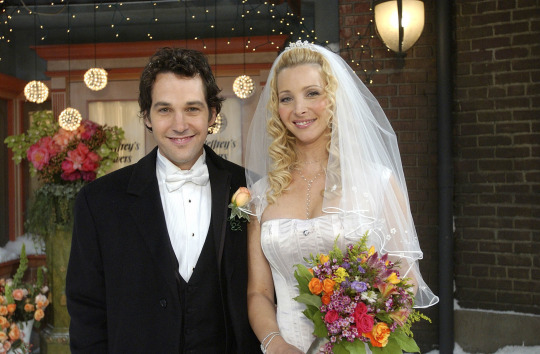
Phoebe marries rich, and to a man who deeply loves her. this is another Punarvasu theme. Since Punarvasu has themes of getting things right on the second try, sometimes Punarvasu natives marry twice.
On the show, Phoebe was originally married to another guy who she married because she wanted to help him get a green card. That again speaks volumes about her kindness and generosity. Punarvasu natives are so kind and giving its kind of stupid. Who the hell marries to help someone? It's very very rare.
Punarvasu natives are also known for their kindness and generosity. Keanu Reeves, Punarvasu Moon is known for this nature of his and Karina from Aespa is another example.
Karina was on a variety show this year after it was announced that she's the ambassador for Converse and she got the whole crew of some 20+ people Converse sneakers??😭😭In fact she's known for her generosity and always gifts the crew when she makes appearances on shows.
Another feature of Punarvasu natives is their random luck, these people are born with lucky charms tbh. Phoebe's massage client, who works at a stock exchange said she'd be good at trading and offered her a job that she declined bc she's not into it. Phoebe meets Mike on a blind date. Phoebe saw an ad for a roommate and thats how she met Monica and the rest of the crew. Phoebe has gone by her whole life on insane luck. Not many people who have had lives as difficult as hers get to experience the kind of blessings she has or retain her sense of enthusiasm and childlike wonder.
Punarvasu natives often have really difficult lives/experiences but it never breaks their spirit, it only makes them kinder. This is their most defining personality trait.
Also if we are to assume the character of Phoebe is Punarvasu Moon then all of her 20s she will have been experiencing her Saturn Mahadasha, and as the show ends, her Saturn mahadasha is also over (because she's past 30/31), she spent all her 20s as a masseuse who makes little money and sings at a cafe, by the end of it, she's married to a rich man and the quality of her life presumably improves.
Other examples of Punarvasu natives random luck includes, Halsey, Punarvasu Moon's song going viral on soundcloud when she was like 20 and being signed to a record company and getting to where she is now, Karina from Aespa was discovered through her IG profile by her current label, Priyanka Chopra, Punarvasu Sun won Miss World at 17-18 yrs old, Katrina Kaif, Punarvasu Sun was modelling in London as a teenager when she got a chance to work on a Bollywood film and now she's one of the biggest stars in India. Shakira, Punarvasu Moon was signed to Sony Columbia when she was 13 (look up the story of how she met that executive, it's so crazy), Caroline Polachek, Punarvasu Moon was selling CDs of her band's album out of a van for $5 which was then bought by a woman who's bf had a popular radio show and played the music on his show, which was then heard by an Apple studio executive who then used the song on an early iPod commercial which was then heard by an executive at Columbia Records who signed them. Mariah Carey, Punarvasu Moon met Tommy Mottola, head of Columbia Records at a party and gave him her demo tape, which he listened to on the car on the way home from the party, he loved it so much he turned the car around to go back and find her but she had already left the party and he spend 2 weeks looking for her, eventually found her and signed her and the rest as they say is history.
#astrology notes#astrology observations#sidereal astrology#vedic astro notes#nakshatras#vedic astrology#astrology#astro notes#astro observations#astroblr#jyotish#phoebe buffay#punarvasu#jupiter
91 notes
·
View notes
Note
Hello. This is a rather mundane question considering all the things, but I got curious. Does Hebrew have accents? How do they vary in and out of Israel?
I understand if you choose not to reply as this is a difficult time for you. In any case, take care🩷🩷🩷
Hi Nonnie! No, don't worry, all questions that are truly interested in Jewish culture are welcome! ^u^
TBH, something to remember about Hebrew is that it has quite a unique history. To the best of my knowledge, it is the only language that was used on a daily basis as the lived in language of a native population, then "died" as a result of Jews being exiled. As they found themselves in other countries, they had to speak the local language. They didn't abandon Hebrew, but it stopped being the langauge in which they lived their daily lives. Hebrew became the language of prayer, of scripture study, and terms from it bled into the local languages Jews spoke, creating Jewish versions of these languages (Yiddish being the Jewish version of German, Ladino being the Jewish version of Spanish, Yevanik being the Jewish version of Greek, and there are also Jewish versions of Arabic and other languages, too), so Hebrew still had an impact on Jews, and they were still connected to it... but it was no longer a "living" language. It was closer to what Latin is today. A language in which religious ceremonies are conducted, that theologians study, but not a language that anyone conducts their daily life in.
Then, as a part of the project of reclaiming and reviving the Jewish native life in Israel that came to be known as Zionism, people set out to revive our native language, too. There was a realization that it had to be adapted to modern life, give it terms for things that didn't exist 2,000 years ago, so it would be useful for people who wanted to conduct their daily lives in Hebrew again. And that's how the last of the Canaanite languages became the only "dead" language to be revived, and return to be the lived in language of its native people.
I mention this unique history, because modern Hebrew isn't the same as biblical Hebrew (though about 60% of modern Hebrew IS biblical). It means if there were different Hebrew accents during biblical times, we don't know it for sure.
At the same time, the fact that Jews were spread out in the diaspora, and their pronunciation of Hebrew (as a dead language) came to be influenced by the local languages they spoke while in exile. So a Jew who returned to Israel from the diaspora in Germany, a Jew who returned to Israel from the diaspora in Argentina, and a Jew who returned to Israel from the diaspora in Yemen do not have the same accent when speaking Hebrew.
But these are not considered regional accents of Hebrew in the same way that you can find different regional accents of English when traveling across England... If we put aside the accents of Jews returning to Israel, and instead we look at the accents of Jews born in Israel, the ones born into speaking modern Hebrew, there's a myth of a Jerusalem accent. I say myth, because you'll hear all over Israel people swearing, that Jerusalemites pronounce a few words differently. The most common example is the word 'mataim' (which means two hundred), and many Israelis insist Jerusalemites pronounce it ma'ataim, with the first vowel prolonged and emphasized. I have lived in Jerusalem since 2002 and I have never heard it. I think in this sense, regional accents are usually, at least in part, a product of geography. It determines how far apart people live, how much they interact, how much they hear others speaking the same language as they do. The smaller a country, and the easier travel in it is, the fewer accents it's likely to produce. And I think that's the main reason why there aren't really accents in Israel (other than those of people who came to speak Hebrew as a second language), because it's a very small country, and because today, it's pretty easy to travel in it (you can cross it from the most northern point to the most southern one in slightly over 5 hours).
I hope that kind of answers it? Thank you for the kind words, I hope you're well, too! xoxox
#ask#anon ask#israel#hebrew#jewish history#jewish#jew#jews#jumblr#frumblr#native israeli#native history#cultural revival#language revival#native revival
79 notes
·
View notes
Text
Servamp chapter 128 translation "ashes to ashes"

READ ON MANGADEX
NOTES
Oh my God...This chapter...more like, one particular page. I spent days trying to figure out the meaning and I still probably don't understand. Maybe I'll talk about it on the stream for chapter 130 because it might not make sense in writing...
Okay, here are some notes because there were words that had furigana and some of them I couldn't write on the pages.

In this panel the furigana for 思い出全部 (all 'the' memories) is 名前すら (not even names), so based on the first reading, the line can also be translated as "If/When someone dies, not all memories disappear".
Page 29
This one...This is the one I had so much trouble with. Do I understand the lines from the first panel? Probably not. I've tried for days to make sense of them, because I understand that line in different ways.
First of all, I can't even say what is "The darkness of someday". Is he referring to himself and the other demons or something else?
My God, I broke down this sentence, like "Ok, this seems to be subject, this is the action, but then there's this grammar part...WTF is going on here, what are u saying man?!" 😭
I spent days on that line and like I said, I might try to talk about it on stream because maybe it's better if you hear me explain rather than writing about it.
Okay, so there's another thing that has to do with furigana. I didn't write on the page because a word that has furigana only once, appears a few times with its regular reading and that's the word 悪魔 "demon". In the second panel in the speech bubble on the left, ぼくら "we" is the furigana for 悪魔 the rest of the times where the word demons appear, it's only that reading, so I didn't want people to think that InnerKuro's actual word in the last panel could have been something like "We (ぼくら) are in every person".
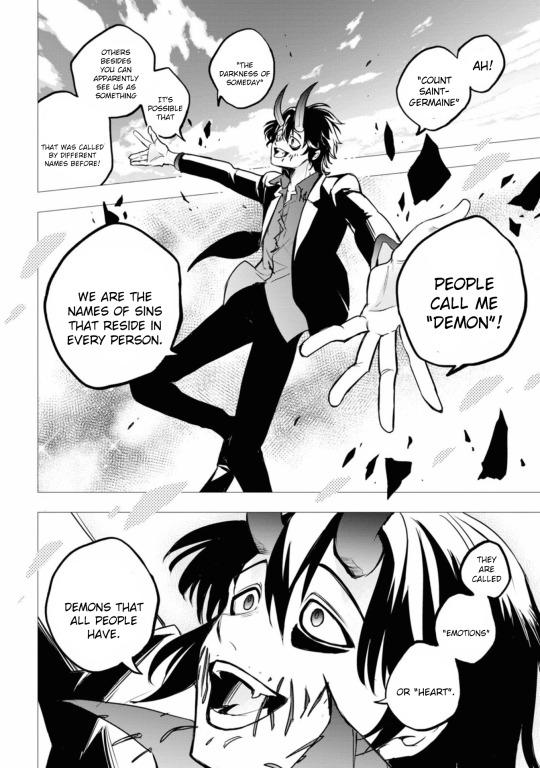
Page 30.

Here we have the word 感情 "emotions/feelings" with the furigana ぼく (first person pronoun "I"), but only in the second, third and fourth panels, the first time where it says "ugly feelings", it's only that reading.
Previously on page 28, Kuro said "these helpless and uncontrollable emotions" and given how the word is associated with InnerKuro here, Kuro could have implied "You (InnerKuro/emotions) are also a part of me."
InnerKuro's last line sounds weird because he doesn't simply say "I will protect you".
きみの一番大切なきみを守るものだ。
Like if I were to translate literally, it would be something like "I will protect your most important/precious you"
There's a possessive there and it's きみのきみ
It sounds weird and it's possible that Tanaka sensei is fuckin with us because the word きみ "kimi" that usually means "you", there are other words that have the same pronunciation and look at that, there is 気味 and looking in the dictionary, its synonymous with 感情 "emotions/feelings".
I hope that the way I translated makes sense...
Last page.
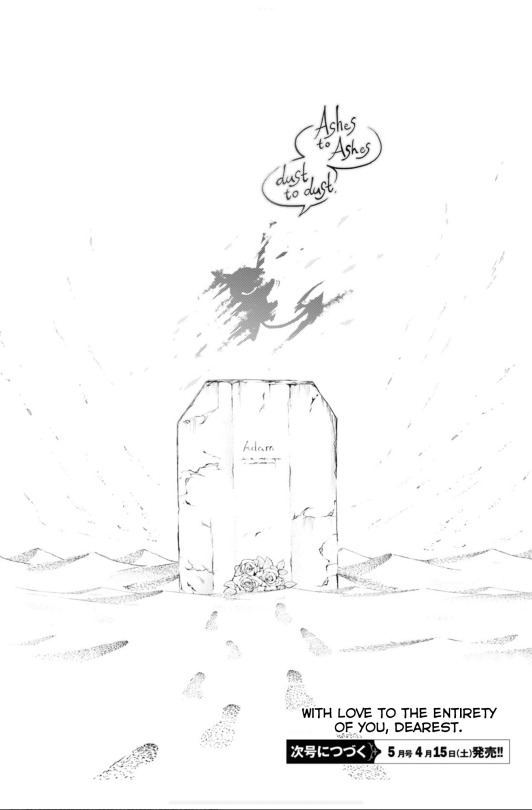
The sentence is here is also weird like the previous one and it needs explaining. I tried my best to convey it's meaning.
親愛なる and 愛をこめて are phrases that can be used when writing letters for example, the first part can be "Dear" (friend or whoever you're addressing) and the last part is "with love/affection"
親愛なるすべてのきみへ、愛をこめて。
The weird part about the sentence is すべてのきみ again we have きみ which means "you" and the phrase translates as "all of you" and you can see how I tried to translated in such a way to make it clear that it's only about one person, because saying "all of you", could be interpreted that it's about more people. The phrase is saying something like "your whole being/ all that makes you"
So, the way I translated might sound weird but hopefully I managed to convey the meaning.
196 notes
·
View notes
Note
cannot believe i spent so long trying to work out when to pronounce 'wy' as 'oi' and when to pronounce it as 'wi-' and it turned out to be dialect
LOL yeah, that caught me out as a kid. In fairness there are times when we'd pronounce them the other way? I don't know the precise rules anymore, but I think if it's a word that starts with "Gwy-" you would usually pronounce it 'wi-' (think of words like 'gwynt' or 'gwydr', for example), while if the word naturally starts with 'wy-' you would usually pronounce it 'oi-' (like 'wyth' and 'wythnos'). BUT there are exceptions to those as well. Mostly it's dialect if you aren't sure!
That said I'm also gaily saying "Yes, in the south we pronounce it 'oi-'" but in fact the phonemes "wy", "oe" and "oi" are all pronounced subtly differently in the south! We are complex and contain multitudes (although it is 100% Fine if you just use the same pronunciation for each, all it means is people can hear you're second language which is considered Good, Actually)
Also! Do you want to know the fossilised Third Dialect Option?
It's now pretty much extinct, but the dialect once spoken in the south east was Gwenhwyseg. The south east, being the place Cardiff is and also closest to the London commuter belt, saw the biggest language losses, so while these days the dedicated work of activists since the 90s has seen a thriving Welsh speaking community now establish in Cardiff and also multiple Welsh language schools in the area, the native dialect has pretty much died out with the oldest generations. What's now spoken is a mix of Cymraeg Byw (the learner dialect) and the various dialects from across Wales as young people move to Cardiff.
But Gwenhwyseg, much like all other dialects of Welsh, had a lot of its own vocab, and certainly its own pronunciation quirks influenced by accent. And there are two big examples of this latter point which have clung on and survived through, of all things, place names in Newport and Cardiff that are still pronounced the Gwenhwyseg way, but other Welsh speakers all wince at and think are non-Welsh speakers fucking it up.
Example one: "ae". Ordinarily pronounced either 'ey' or 'eye'. In the word 'caer', a common part of Welsh placenames, it's pronounced 'kire'.
In Newport, the area near the old hillfort called the Gaer is pronounced "Gare". In Newport, Caerau Road - normally pronounced "kire-eye" - is pronounced "Carer" Road. This is correct for Gwenhwyseg pronunciation.
Example two: "wy". Ordinarily either 'wi' or 'oi', as established; but both north and south are agreed that it's one syllable, right?
In Cardiff, there is a road called Crwys Road. It's pronounced "Croo-iss" Road. This is correct for Gwenhwyseg pronunciation, which would say 'wy' as two syllables.
As I say, though, that's pretty much lost now, soon to be extinct. But still! Fun With Accents.
372 notes
·
View notes
Text
Studying languages tip #IDK
Reminder for my fellow language learners (not just Italian learners): do not just "listen" to your target language (and I mean also with subtitles), repeat out loud.
Repeating out loud what you hear can help you fix in your mind the actual sound of a word and remember it better, and also recognize it whenever you hear it from natives. Do not just rely on how you remember the sound of a word, at least not in the first days you're learning it.
So for example:
1- search for easy youtube videos in which there are only words lists pronunciations. Kids videos generally will do. (Reminder if you're studying Italian I have posted a few audios in the "#audio audios" section and you can listen to them or ask me to make some more, talk slower or whatever). You can also search for kids' songs if you want, and break them down to easy words.
2- choose a song you like or by your fav artist (in your target language). Find the lyrics and follow your artist voice for a few times, then start singing along with them. It doesn't matter if some words will sound weird or be uncorrect or you'll end up saying "blabluojaos" instead of "macchina" even if you know how to pronounce "macchina": you're singing, following the rhythm and thinking about the pronunciation of the next words as well: it's a lot. Just take your time and remember, you can do it more than once and for a few days too.
[I learned English and many vocabs more cause while I was having lessons in school I kept listening to English songs: for example I ended up learning by heart Linkin Park's songs and nowadays I can still sing Mike Shinoda's rap parts. So if I made it, you can too].
3- if you're watching movies, or anything you can stop and replay, try to stop and repeat especially the words you find "uncommon" or that you have never heard of. Listen to the actor/person saying them a couple of times, then repeat them a couple of times. You can also repeat the whole sentence you heard from the actor/person, note your word down and search for its meaning if it's not clear (it may also have more than one), and maybe try to use it in different sentences (make them up).
[again, if you're studying Italian and need help with meanings, transcriptions -maybe you're not sure you heard a word correctly-, how to use a word... feel free to drop an ask or search in the vocabularies you can find on @sayitalianohome ]
Just beware: once more, especially if you're studying Italian, it may happen that the singer of your choice or actor/person speaking, may not use a "standard" Italian but a regional form or abbreviations or something like that. So keep in mind that you MAY learn words in a specific sound or with a specific use that MAY not always be the one we know/use in common Italian (but you can check it anyway).
Back to my personal example: I have learned not just English but also Spanish by listening to songs. My "mistake" was that I kept listening to American English and South American Spanish: this is why when I listen to British/UK English and (Spain) Spanish, I still have some troubles in understanding some words (depends on the accent of the speaker tbh). But ofc you can ask for people to repeat, there ain't nothing bad in it.
(And yeah, when I speak English I tend to use an American accent and same for my South American Spanish, cause those are the accents I am more used to and I learned better).
Anyway, don't be scared, sing, yell, talk out loud. It's gonna make a huge difference in your learning life.
#studyblr#langblr#languages#language learning#studying tips#language#polyglot#learning languages#languageblr#studying languages
126 notes
·
View notes
Note
Hey, I just wanna know from where did you start learning thai? Also, what advice do you give to those who wanna start learning it
Hiya anon ✨

I'm not sure how much help I can be, considering I'm not doing a course or following an app or anything people usually do for language learning 🥴 I've been learning mostly by immersion tbh - I've been almost exclusively watching Thai series for over a year now, plus interviews, variety shows, youtube content, songs, so many songs lol, tweets, etc.
My personal learning approach is pretty loose and chaotic lmao but here goes:
1) The biggest hurdle for me was the script. Apart from already having started to notice recurring words being said in the Thai BLs I was watching at the time, I also wanted to be able to read people's tweets!
In the end, it was a combination of 1) an app I happened to find (Pocket Thai Master for Android, it's free on the Play store!) and 2) the Wikipedia article on the Thai script that both helped me to understand and start reading and writing.
Coming from a non-tonal mother tongue, learning the script early on really helps to understand the tones in Thai so it's something I would for sure recommend!
2) I started keeping a lil vocabulary notebook (you know those two-column ones?) shortly before my Bangkok vacation earlier this year. It not only helped with new vocabulary but also kept me practicing writing!
Anytime I encounter a new word, I look it up on either or all of the following online dictionaries: thai-language.com, thai2english, Longdo Dictionary (which I literally just now realized can be set to English in the upper right corner, I've just been using it in Thai ever since I found it djsjdh), Wiktionary in Thai, or if all else fails I google it and might find an old forum entry or maybe an article if it's a slang word or idiom.
I recall having dinner in a Bonchon in Bangkok and brokenly asking the waitress for chopsticks so, while waiting, I looked up and took down the word's spelling and pronunciation and when she came back and saw me copying all the info into my little notebook liKE A NERD she laughed and complimented me for the effort haha
3) If I hear a Thai word I'm unfamiliar with that I can't look up because I don't know the spelling, there's a few approaches. If I have context for its meaning, for example subtitles, then I look up the translation instead and hope I find it.
If I don't, then there's the option of using thai-language.com's Reverse Phonemic Transcription function (this site in general is my holy grail tbh, it's why I mostly stick to its romanization style for any of my #local woman harps on about linguistics posts).
Another option is using the papago app's speech-to-text function. Yes, you read that right. A Korean translation app, that I previously used when I was learning Korean and thus still had on my phone, proved to be useful for me to make sense of the spelling or pronunciation of Thai words. At the beginning, I only used it to read me homonyms out loud so I could parse the difference in tones lol but then I realized it wasn't half bad at rendering an accurate transcription! Sometimes I use that feature to check my own pronunciation or remind myself of the spelling of a word.
4) I always like to recommend @lurkingteapot's comprehensive Thai language learning resources post (it's far more coherent than my post here lol). And shoutout to @recentadultburnout for posting about Thai language and culture as a native speaker (both on tumblr and on ao3)! 🙏
5) This might be minor or self-evident but ya know- install the Thai keyboard for your devices! You're gonna need it sooner or later anyway if you wanna actually use the language. And if you're a keycap and keyboard nerd like me and happen to fall in love with a keyboard in a Siam Discovery store ehem then I do recommend getting a Thai layout keyboard (or keyboard stickers!) because that has proven to help me a lot in terms of ease of learning on desktop and familiarizing myself with letters I don't often encounter.
Throwback to that one time I was on the train, revising consonants and their tone classes, and indignantly texted a very confused yet amused family member a photo of my hand-written copy of the Thai consonant table, asking how I'm ever supposed to differentiate between ฎ and ฏ!! Even now, I have to lean in and squint like an old lady to see the difference on desktop. 😭
I hope at least some of this proves to be helpful in your quest to learn Thai! In any case, you're not alone on tumblr or in our little BL/GL/QL fandom bubble - I know of several users who are learning Thai, like @airenyah and @philologique and the aforementioned @lurkingteapot, just to name a few I personally follow and who I'm sure all have their own advice to give if you shoot them an ask~
สู้ ๆ นะ :)
/suu suu na/
23 notes
·
View notes
Text
miles morales & his spanish
I’d like to start with the disclaimer that headcanons are headcanons and if people are having fun with fluent Miles, then have fun. I’m so proud to see a Spider-Man with the blood I was raised with, with a mother who gives her bendiciones and kisses her son with the love I have seen my whole life.
And while my discussion may be in criticism of some things, I need to communicate this before anyone thinks otherwise.
I am proud of Miles Morales and what he represents. I love to see his family really feel like the life of someone in the diáspora. It is heart melting, and it is worth so fucking much to me as someone that’s seeing the growing recognition on this small, lovable, beautiful island. He is a part of the pride of my flag and of my home.
So yeah, I love that Miles Morales is Boricua.
But I do have some things I want to point out on Miles and the way he’s been observed within the fandom. After all, he’s kind of been discoursed into two people, neither of which I agree are accurate in the language sort of terms.
The first point is the following.
Miles is not a fluent Spanish speaker, switching between languages in sentences because he can’t remember words or he’s lost in his own head. He thinks in English.
Miles is not fluent enough, as observed by his vocabulary and sentence structure to think in Spanish. He is not a fluent character. He rushes words and in turn, speaks in Spanglish.
His pronunciation is the one thing that can be argued if the previous factors weren’t there.
One can be fluent in English and still struggle with pronunciation.
However, that requires well developed grammatical knowledge, which we haven’t observed enough from Miles.
There’s only two full, Spanish spoken sentences that we see in the whole movie, which I will quickly break down.
“¿Qué tal tío?” Directly translates to “how are you, [insert colloquial term of impersonal endearment]”.
This is a quick greeting, not colloquial to Puerto Rican Spanish, and thus can be quickly assumed to be a class-learned thing. Which, you know, doesn’t help the argument that he is fluent.
And then there’s this:
“Te trajé una empanada.” That translates to “I brought you an empanada”.
Once again, this is a very easily taught sentence. Actually, it’s grammatically found to be a simple sentence, as it holds only one verb. But also, he pronounces the verb wrong. He pronounces it almost as “dress” instead of “brought you”. The meaning shifts with the spelling of the word (ex. papa vs papá).
The second point follows.
Miles doesn’t need to be fluent to be a Spanish speaker.
The Spider-Man clearly showcases understanding of his mother in the college counseling scene, and that is enough to observe him as a Spanish speaker.
People can say they speak a language after having enough knowledge to hold a conversation. The previous evidence observes Miles being able to conduct an introduction and a point. That’s enough words to be passable when ordering food, yk? And that’s good enough.
He’s definitely able to capture terms and realize what words mean, which clearly showcases how he can continue his effort to know more, but still has enough basics to communicate himself.
And now, the final point.
He doesn’t need to be a Spanish speaker to be Puerto Rican.
Miles isn’t explored enough in the language to show his understanding of Spanish as fluent.
And that’s okay.
Miles represents a very specific type of person. But also, he represents millions of experiences.
Being from somewhere else, being from a diáspora is an experience that while I personally haven’t been able to relate to fully, millions have.
For example, all immigrants know what a diáspora is. Maybe not in the coined term, but in its significance and its pain. Being away from a motherland and living in a fundamentally different nation.
But Puerto Rico is an interesting situation because it’s officially part of the United States’ territories, but is still experienced as a foreign place. One of its fundamental differences is the main language explored in the island, being Spanish vs the US’ English.
And because of its particular, and very colonial-esque, nature around the island, Puerto Ricans can often find the discourse of what makes a Puerto Rican a Puerto Rican. Born, raised, fluent, and influenced by Puerto Rican culture are oftentimes the most important aspects to acknowledge someone as being from here.
Many times, people from diásporas find themselves being rejected in where they live, but are just as marginalized from where they come from (biologically, culturally, or otherwise). And this experience is what often bothers me about the whole situation regarding Miles’ Spanish.
Because Miles, and any other Puerto Rican, doesn’t owe people a certain origin to be a Boricua. You can live your whole childhood in England after moving from the island, and still say you are Puerto Rican. You can be raised by Puerto Rican parents and never step into the island’s soil, and you are still Puerto Rican. You’re able to be born somewhere else, but be raised and loved by a family here, and you are still Puerto Rican. You are who you are, identity is in your grasp, and no one owes anything to others.
He doesn’t have to speak the language to still identify with the life of a Puerto Rican. Which is why it surprises me to observe people finalizing him as either not a speaker at all because he isn’t fluent (which btw implies he is less connected to his roots when you take away his interest in knowing) or he is fluent (which then takes away about his experience in the diáspora).
This is not to say that people in the diáspora cannot be fluent, just like they cannot be fully disconnected from the Spanish language. I’m personally identifying that Miles can be in between, and still be characterized as who he is within his canonical identity.
Final notes:
When wanting to write more Puerto Rican influenced work, be sure to inform yourself! There’s a lot of things to learn about, and it’s always lovely to know more.
Boricua is a term used in the island to refer to Puerto Ricans.
I definitely encourage people to inform themselves of the term diáspora, especially if you are of foreign descent from where you live!
And of course, thanks for reading!
#miles morales#across the spiderverse#spider man: across the spider verse#spider man: into the spider verse#atsv#spiderman atsv#spanish#puerto rico#puerto rican#puertorriqueños#i got tired of people misidentifying miles#this is what it means to me#miles morales speaks spanish
50 notes
·
View notes
Text
lost in translation (ch 10)
a (non-exhaustive) list of differences or cultural references i noted down for the translation of chapter 10 while watching the chn and eng versions side-by-side. previously i did the same thing for chapter 9.
disclaimer: i am not fluent in chinese, so keep in mind that there will be mistakes. feel free to let me know if you have questions, concerns, or comments.
overall: not too much stood out to me. after looking back on my comments on ch 9, i guess there was less awkwardness in this chapter's translation since i didn't really make a notice things like clunky grammar or sentences. i feel like most of these examples are more like fun facts or nitpicking rather than things i really feel like i need to correct.
rhinoceros horn
心有灵犀一点通, or just 心有灵犀, is a well-known idiom that uses the rhinoceros horn as a metaphor. the idiom definition from the pleco dictionary app:
(idiom) hearts which beat in unison are linked;
hearts linked as one, just as the proverbial rhinoceros communicates emotion telepathically through his single horn (idiom); fig. two hearts beat as one
so it can be used to describe people who are connected or very in sync. and here's the description of the rhino horn, also from a pleco definition:
magic horn (i.e. rhinoceros horn with its threadlike white core, mentioned in old texts as having a high sensibility)—heartbeat in unison
身无彩凤双飞翼, 心有灵犀一点通。(李商隐《无题》)
Shēn wú cǎi fèng shuāngfēi yì, xīn yǒu língxī yīdiǎn tōng.
For bodies no fluttering side by side of splendid phoenix wings, | Between hearts the one minute thread from root to tip of the magic horn. (The second line is often quoted as meaning a meeting of minds.)
the white threadlike core connecting each end of the horn is why it's used as a metaphor for connection; considering this imagery, having the horn hold the wick of a candle also makes perfect sense.
i know the story focused on the role of the rhinoceros horn in 异苑 "Bizarre Gardens", but i'm not familiar with the work so i won't try to add beyond the game's explanation :') i'm just noting the reference that i was aware of
10-1

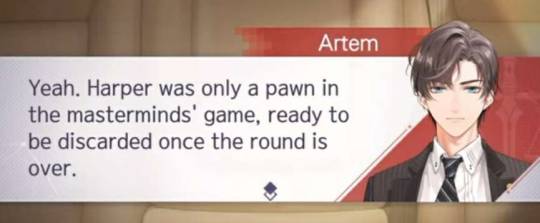
no issues with the translation, but there's a bit of wordplay in the chinese version. translated more literally, it would be something like "and once the round was over, the pawn [棋子] simply became something to be discarded [弃子】." the bolded words are near-homophones, both pronounced "qizi" with just a difference in tone.
10-3
the number four is seen as unlucky in chinese culture (and other east asian cultures) since its pronunciation sounds like the word for "death". by extension, the number 14 is also unlucky, which is why prankster started the "ghost" appearances on the 14th floor of the building.
general note on translation; a lot of times in the narration, short descriptors are lost in the process of chn -> eng, probably since the full translation would make the sentence a bit unwieldy. usually it's not super important or the the meaning that it carries is made redundant through other context. for example, in 10-3, when they're discussing the culprit of the mischief in the office:

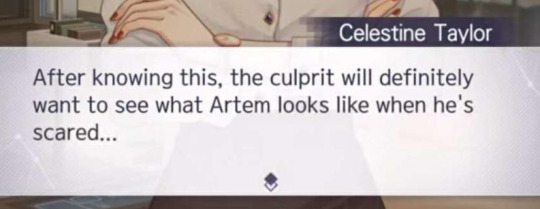
this contains the phrase "artem, who [the culprit] hates". this could be considered redundant through context (because why else would someone be targeting artem in this way?) but in eng, they don't specify this as it does in the original text.
another example in 10-5 when they confront the fortuneteller:

there were a few adverbs dropped from the translation in this section. i picked this one since it had the most change; in chn, she casually glances over it, but in eng, she "inspects" it which sounds much more thorough.
10-13

陆景和一改刚才冷峻严肃的模样,直接不顾形象地斜坐在会议室的长桌上。
Marius changes from his cold demeanor from earlier, and he sits down at the long table in the conference room with no regard for his image.
i... feel like the meaning got flipped to its opposite meaning and it's so puzzling that i'm still wondering if i'm just interpreting it wrong?? hence my typing out the chn text too, so other people can check it as well. i even tried a few different machine translations but this is still my conclusion. anyway, if my analyses so far are correct, this would be the second time that marius's personality becomes a bit harsher after the eng translation (it happened before in ch 9).
10-21

If it weren't for the fact that the copy [of the report] was still there and that it was something I had only mentioned to Artem, I would have thought that he had long since known what I was planning to do next.
also a sentence flipped to basically the opposite meaning, to the point that i doubt myself, but i think this time it's because the sentence is a bit long with a lot of confusing negatives
10-26
When visiting Brigid Gries:



You: Yeah, gege's right! Don't worry, you'll be fine!
//
[Brigid's writing:] "Thank you, shushu and jiejie"
//
Without stopping to tease that "shushu", you and Artem exchange a glance.
this is another situation with ways of addressing people in chinese; please check my comments on the scene in chapter 9-14 if you want an explanation of the terms.
rip rosa. you tried xD but looks like artem can't escape the shushu/uncle allegations 😔 and Brigid even called rosa "older sister" right in front of them both... ice cold.
also this time, jerome is just himself shushu

now switching scenes to vyn:

on second thought this might be too trivial, but whatever, we're already here and i have the screenshot and i'm a vyn blog. basically in chinese, vyn "looks up at Matthew Richter with a smile that's not quite a smile." that's pretty much the most literal definition of the phrase, and since it's vyn we can probably already assume that the smile wouldn't be a simple happy one, but yeah. now the last one!
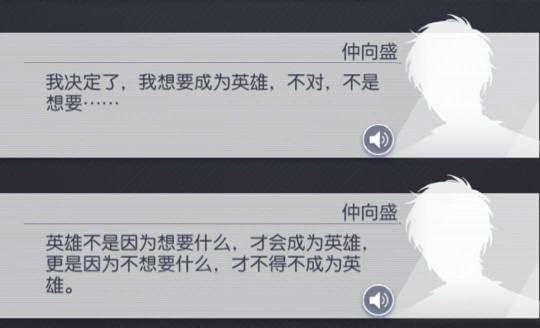
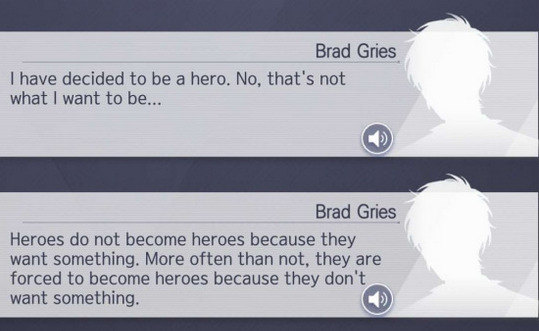
I have decided that I want to become a hero. No, that's not right. It's not that I want to…
revised version leads more naturally into his next sentence as he explains himself. this is actually a nice transition since i'm going to mention this scene again in another post about ch 10, so stay tuned!! and thanks for reading, let me know what thoughts you had about this or the chapter ^^
#tears of themis#tot rosa#artem wing#marius von hagen#tot translation#tot artem#vyn richter#tot vyn#tot marius#lol carefully checking which characters are actually mentioned in this post since there are few (petty) things i hate more than spam taggin#thoughts of themis#ALMOST FORGOT THAT ONE#should i make ''lost in translation'' a tag?? or should i make people just scavenge for those posts on my blog
25 notes
·
View notes